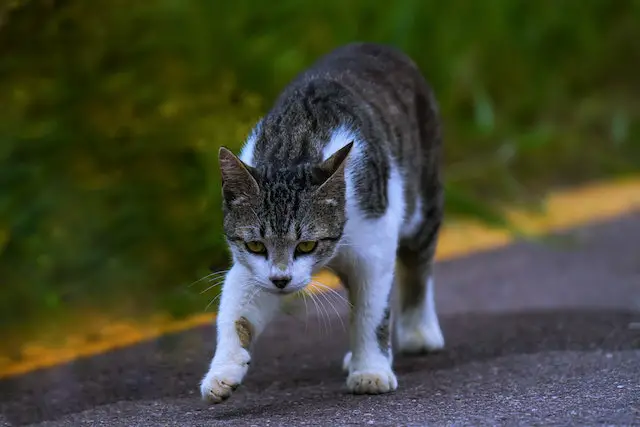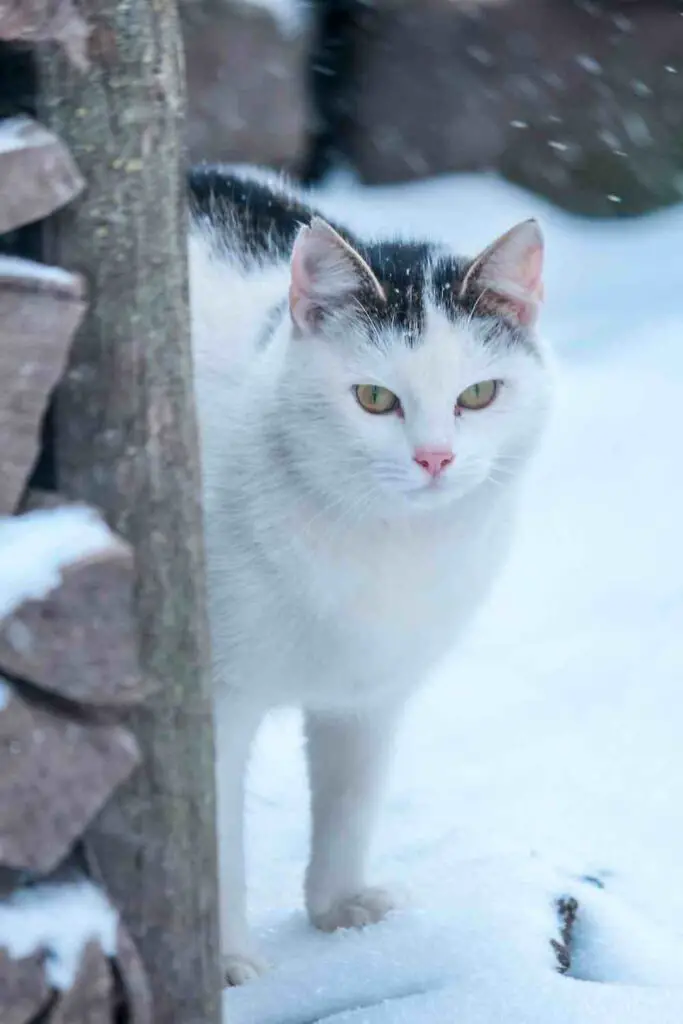9 Potential Factors Affecting Outdoor Cat Lifespan

Fellow kitty enthusiasts, let’s discuss the outdoor cat lifespan…
If you’re anything like me, you’ve probably wondered about the secret to a long and fulfilling life for our feline friends.
Well, today we’re diving headfirst into the fascinating world of outdoor cat lifespan. So, grab a cup of tea, settle in, and let’s uncover the mysteries behind our beloved outdoor cats and their incredible endurance.
What are outdoor cats?
Outdoor cats are domestic cats that have access to the outdoors, typically roaming freely in their environment. Unlike indoor cats that remain within the confines of their home or controlled space, outdoor cats can explore the outdoors, hunt for prey, and interact with their natural surroundings.
However, allowing cats outdoors can expose them to various risks, including traffic, predators, and infectious diseases.
How long do outdoor cats live?
On average, outdoor cats have a shorter lifespan compared to indoor cats. Outdoor cats typically live for 2 to 5 years, but some can survive longer, reaching up to 10 years or more with proper care and favorable living conditions.
However, outdoor cats face numerous risks such as exposure to diseases, accidents, predators, and other hazards that can significantly impact their lifespan.
Learn more about the dangers of outdoor cats.
Factors Affecting Outdoor Cat Lifespan

The following are some common factors affecting outdoor cat lifespan:
1. Presence of Predators
Outdoor cats are natural explorers, but the presence of predators in the wild can pose serious threats to their safety. Larger animals like coyotes, foxes, and stray dogs might see your cat as potential prey.
To fix this factor, creating a safe outdoor space is essential. A cat enclosure or catio provides a controlled environment where your cat can still enjoy the outdoors without being exposed to the dangers of the wild.
These structures are usually made of sturdy materials with mesh or wire, offering a secure barrier against predators while allowing your cat to experience nature safely.
2. Traffic and Accidents
Busy roads and streets are hazardous for outdoor cats. The speed and noise of vehicles can startle them, leading to accidents and injuries. To address this, consider supervised outdoor time.
Take your cat outside on a leash and harness, allowing them to explore nearby areas while keeping them under your watchful eye. This way, you can intervene quickly if they get too close to the road.
Alternatively, installing a cat-proof fence around your yard provides a physical barrier that prevents your cat from wandering onto busy streets, reducing the risk of accidents.
3. Contracting Infectious Diseases
Outdoor cats are at higher risk of contracting infectious diseases, as they come into contact with other outdoor cats, wildlife, and various environments. Some common diseases include feline leukemia (FeLV), feline immunodeficiency virus (FIV), and upper respiratory infections.
To safeguard your cat’s health, adhere to a regular vaccination schedule recommended by your veterinarian. Vaccines can offer protection against certain diseases and boost your cat’s immune system.
Moreover, scheduling routine vet check-ups helps detect any health issues early on, allowing for timely treatment and care.
4. Risk of Parasite Infestation
Fleas, ticks, and worms are common parasites that can infest outdoor cats. These pests can cause discomfort, skin irritations, anemia, and even transmit diseases.
To fix this factor, it’s crucial to use veterinarian-recommended parasite prevention treatments regularly. These treatments might include topical solutions, collars, or oral medications, depending on your cat’s specific needs and lifestyle.
Regular grooming sessions can also help identify and address any parasite issues promptly.
5. High Risk of Poisoning
Outdoor cats might accidentally ingest toxic substances, either through direct contact or by consuming contaminated prey. Common poisons include antifreeze, rat poison, certain plants, and chemicals used in gardens.
To address this factor, be vigilant about storing chemicals and hazardous substances out of your cat’s reach.
Keep toxic plants out of your garden, and opt for pet-safe alternatives in pest control methods. If you suspect your cat has ingested something harmful, seek immediate veterinary attention.
6. Temperature Extremes

Outdoor cats are exposed to various weather conditions, including extreme heat and cold. High temperatures can lead to dehydration and heatstroke while freezing temperatures can cause hypothermia.
To address this, provide a well-insulated shelter for your outdoor cat. A sturdy cat house with proper bedding and insulation offers protection from the elements.
Additionally, ensure your cat always has access to fresh, clean water, especially during hot weather when they might be at risk of dehydration.
Learn more about how to keep your outdoor cats warm in winter.
7. Dietary Challenges
While outdoor cats are skilled hunters, they may not always catch enough prey to sustain themselves entirely. This can lead to nutritional deficiencies and health issues.
To fix this factor, ensure you provide a balanced and nutritious diet for your cat at home. High-quality cat food, both wet and dry, can offer essential nutrients that might be lacking in a solely prey-based diet.
Your veterinarian can guide you in selecting the right type and amount of food based on your cat’s age, weight, and health condition.
8. Stress and Anxiety
Outdoor cats may encounter stressful situations, such as territorial disputes with other cats or encounters with unfamiliar animals. Chronic stress can weaken their immune system and lead to behavioral problems.
To address this factor, create a calm and enriched indoor environment. Offer toys, puzzle feeders, scratching posts, and climbing structures to keep your cat mentally stimulated and physically active.
This enriched environment can help reduce stress and anxiety, making your cat feel more secure and content.
9. Regular Veterinary Check-ups
Routine veterinary check-ups are essential for monitoring your cat’s health and addressing any potential issues early on. Annual visits to the veterinarian allow for a thorough physical examination, vaccinations, and preventive care.
Regular check-ups enable your veterinarian to identify and treat any health problems before they become serious or life-threatening.
Additionally, don’t hesitate to schedule an appointment if you notice any changes in your cat’s behavior, appetite, or overall well-being.
Learn more about the benefits of outdoor cats.
Tips for Extending Outdoor Cat Lifespan

The following are some common tips for extending outdoor cat lifespan:
- Have Regular Veterinary Check-ups: Regular check-ups with a veterinarian are important for monitoring your outdoor cat’s health and catching any potential issues early on. Vaccinations and parasite control should also be part of their routine veterinary care.
- Provide a Safe Environment: Create a safe outdoor environment for your cat by providing a secure and enclosed space, such as a cat enclosure or catio. This will protect them from potential dangers like traffic, predators, and accidental injuries.
- Spay or Neuter Your Cat: Spaying or neutering your outdoor cat helps prevent unwanted litters and reduces the risk of certain health issues, such as reproductive cancers and roaming behaviors.
- Ensure Proper Identification: Outdoor cats are more prone to getting lost or straying far from home. Ensure your cat has a collar with identification tags and consider microchipping them for permanent identification.
- Provide High-Quality Nutrition: Outdoor cats tend to be more active and may require a higher calorie intake to meet their energy needs. Feed them a balanced diet of high-quality cat food that is suitable for their age and activity level.
- Offer Fresh Water: Ensure that your outdoor cat has access to fresh and clean water at all times. Consider providing a water source that is not easily contaminated or tipped over, such as a sturdy water bowl or a pet water fountain.
- Environmental Enrichment: Outdoor cats benefit from mental and physical stimulation. Provide them with toys, scratching posts, climbing structures, and hiding spots to keep them engaged and entertained.
- Regular Grooming: Outdoor cats are more likely to accumulate dirt, debris, and parasites in their fur. Regular grooming sessions, including brushing and checking for ticks or fleas, can help keep their coat healthy and prevent skin issues.
- Supervise Outdoor Time: Keep an eye on your outdoor cat while they are outside to ensure their safety. Avoid letting them roam unsupervised during times of increased risk, such as at night or in areas with heavy traffic.
Remember, the lifespan of an outdoor cat can vary depending on various factors, including genetics, environment, and overall health.
Following these tips can help promote a longer and healthier life for your outdoor cat, but it’s essential to consult with your vet for personalized advice and guidance based on your cat’s specific needs.
Learn more about bringing outdoor cats indoors.
Related Questions
How long do outdoor cats live on average?
The average lifespan of an outdoor cat can vary greatly. On average, outdoor cats have a shorter lifespan compared to indoor cats, primarily due to increased exposure to dangers such as predators, diseases, and accidents. While some outdoor cats may live 5-10 years, others can live well into their late teens or early twenties if they are provided with proper care, nutrition, and protection.
What factors affect the lifespan of outdoor cats?
Several factors can impact the lifespan of outdoor cats. These include access to fresh food and clean water, exposure to harsh weather conditions, interaction with other animals, availability of veterinary care, genetic predispositions, and the overall safety of their outdoor environment. Providing a safe and enriching environment for your outdoor cat can help extend their lifespan.
Can I increase the lifespan of my outdoor cat?
While there are no guarantees, there are steps you can take to potentially increase the lifespan of your outdoor cat. Provide regular veterinary care, including vaccinations and spaying/neutering. Feed a well-balanced diet appropriate for their age and health. Create a safe outdoor space, such as a screened-in porch or a catio, where they can enjoy fresh air and sunshine while minimizing exposure to hazards.
Should I keep my cat indoors to ensure a longer lifespan?
Keeping your cat indoors can indeed increase their lifespan and protect them from many potential risks. Indoor cats generally have a longer lifespan due to reduced exposure to accidents, diseases, parasites, and predators. However, some cats may be happier and healthier with access to an enclosed outdoor space or supervised outdoor time. It’s important to assess your cat’s individual needs and the safety of your environment.
How can I keep my outdoor cat safe?
To keep your outdoor cat safe, consider implementing a few precautions. Provide a secure and comfortable shelter to protect them from extreme weather conditions. Make sure they have access to fresh water and food away from potential contamination sources. Keep up-to-date with vaccinations, flea/tick control, and annual veterinary check-ups. Additionally, consider using a breakaway collar with identification tags or microchipping your cat for easy identification if they get lost.
Learn more about why outdoor cats might be happier than indoor cats.
Conclusion
The lifespan of outdoor cats can be a topic of concern for many pet owners. However, it’s important to remember that each feline friend is unique and their lifespan can vary based on various factors. While outdoor cats may face certain risks and challenges, they can also enjoy a fulfilling and adventurous life.
So, whether your furry companion is an indoor cat or an outdoor adventurer, cherish every moment you have together and always prioritize their safety and well-being. After all, their love and companionship are what truly matters.
